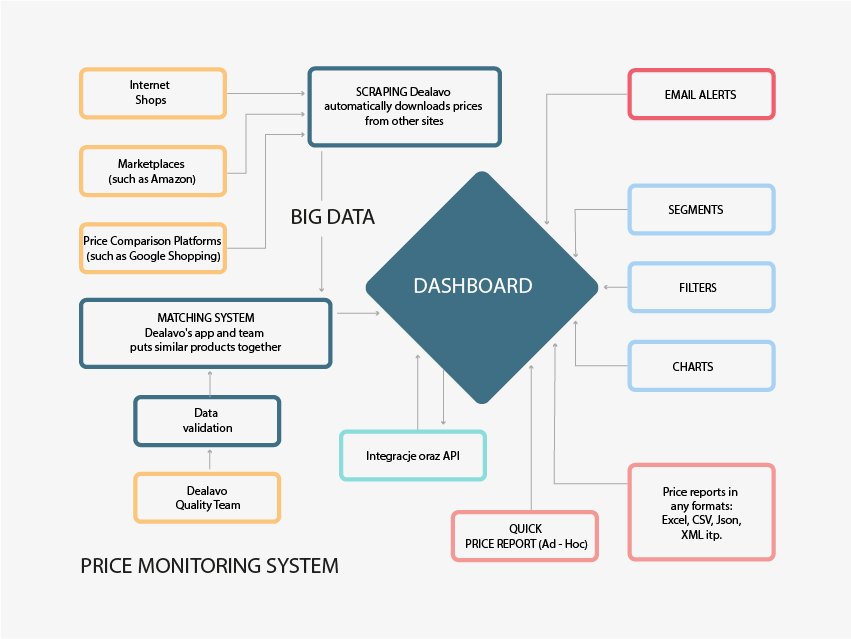
Key Aspects of Product Matching in Price Monitoring Process
- 26 August 2024
Product matching in the context of e-commerce refers to the process of identifying and linking identical or similar products across different online stores or platforms, even if they are described or categorized differently. This process is essential for price comparison, competitive analysis, inventory management, and ensuring that consumers see accurate product information regardless of the platform they are using.
Product matching is a critical component of e-commerce, especially in the increasingly competitive world of online retail. Whether you’re a small business owner trying to keep up with giants, or a large retailer looking to maintain a competitive edge, mastering the art of product matching can make all the difference.
Identifying Similar Products
Products might be listed differently across various e-commerce platforms, with variations in titles, descriptions, and specifications. Product matching algorithms work to identify these similar items, despite the differences in how they are presented.
For instance, one retailer might list an item as “Samsung 65-Inch 4K Ultra HD Smart LED TV,” while another might describe it as “Samsung 65” UHD Smart TV.” Despite the different wording, these two listings refer to the same product.
However, there are some challenges worth noting when it comes to identifying products. First of all, products and listings change frequently, so matching algorithms need to be constantly updated and refined. Sometimes, the listings might also go missing, and retailers might use varied naming conventions for the same product. All of this only adds more layers to the overall difficulty of product matching in e-commerce.
Standardization
Once similar products are identified, the next step in the product matching process is standardization. The process often involves standardizing product information, such as converting all measurements to the same units or matching brand names that may be abbreviated or spelled differently.
Standardization eliminates discrepancies that might arise from differences in units, naming conventions, or other variables. Strategies of standarization may involve brand name normalization or setting fixed categorization rules.
Handling Variations
Product matching must account for variations, such as different sizes, colors, or models of the same base product. The system needs to understand and distinguish these variations to avoid incorrect matches.
Types of variations
There are three most common types of variation that may occur when handling product matching in e-commerce:
- size variations – some items like clothes often come in different sizes, so the system needs to recognize that a “32GB iPhone 12” is not the same as a “64GB iPhone 12,”
- color variations – fashion items and tech products may also come in multiple colors (the system should distinguish between, for example, two variants of the same model of a Samsung phone, like a black one, and a white one),
- model variations – this is especially important in the tech market, since even the slightest model variations can have tremendous impact on products’ prices and availability.
Data Source
The data used for product matching comes from a variety of sources, including product listings, descriptions, images, and even customer reviews. Advanced algorithms may also incorporate natural language processing (NLP) to understand and match products based on descriptive content. For instance, NLP can identify that “cordless vacuum” and “wireless vacuum” might refer to the same product. The more data points you have, the more accurate the matching process will be.
Use Cases
Retailers and brands use product matching to track competitor pricing and adjust their strategies accordingly. One of the top solutions in this space is Dealavo. Whether you’re monitoring competitor prices, managing your inventory more efficiently, or aiming to improve the customer experience, Dealavo offers a robust set of tools tailored specifically for e-commerce owners.
Dealavo – Price Monitoring and Competition Tracking Tool for E-commerce
Dealavo is a tool designed to help e-commerce companies remain competitive by offering advanced price monitoring and product matching solutions.

When it comes to product matching for e-commerce, Dealavo should fully satisfy your business needs. This is because it offers:
- high precision of data – this precision is the key for effective price comparison and monitoring, enabling you to stay ahead of the competition with real-time price adjustments,
- in-depth data analysis and market insights – Dealavo provides detailed insights into your competitors’ strategies, promotions, and pricing trends for you to make more informed pricing decisions,
- robust Dynamic Pricing feature – Dealavo’s Dynamic Pricing with repricing solutions automatically adjust your prices based on real-time market data to let you stay competitive without the need for constant manual updates,
- improved inventory management – precise product matching across different suppliers and platforms helps streamline your inventory management.

Conclusions
As e-commerce grows and evolves, so will the importance of product matching. Businesses that master this process will be better equipped to navigate the competitive landscape of e-commerce.
Regardless of your company’s size, consider trusting Dealavo. With our free 7-day trial, you will be able to check how Dealavo’s Dynamic Pricing and competition tracking capabilities can support you with the product matching in your e-store.





